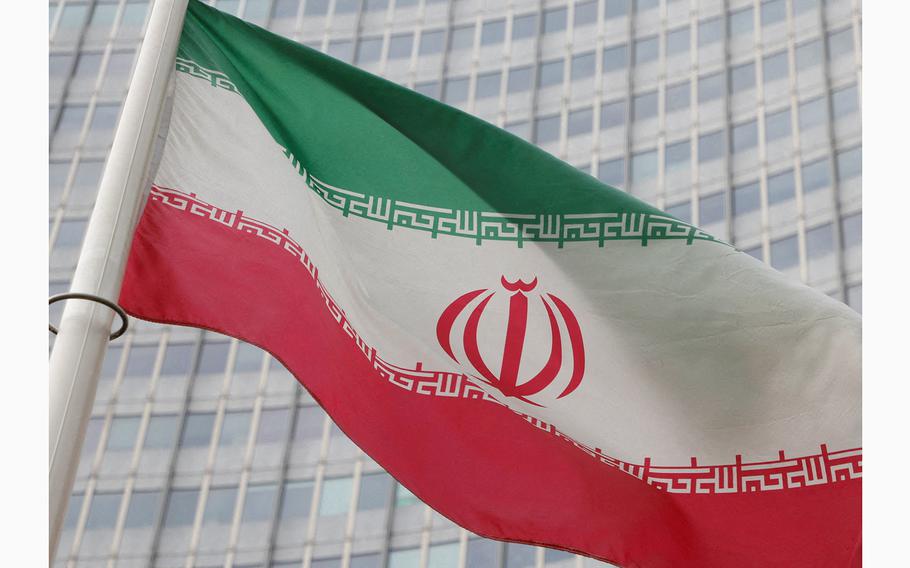
The Iranian flag flutters outside the International Atomic Energy Agency (IAEA) headquarters in Vienna, Austria, March 6, 2023. (Leonhard Foeger/Reuters)
The release of a newly surfaced audio recording has once again thrust Iran’s 1988 massacre of political prisoners into the global spotlight, exposing chilling details of one of the most heinous crimes of the 20th century.
According to Justice for the Victims of the 1988 Massacre in Iran, this recording — capturing a second meeting between Ayatollah Hossein-Ali Montazeri, then-deputy to the regime’s Supreme Leader Ayatollah Khomeini, and members of the notorious “Death Commission” — offers irrefutable evidence of the systematic execution of thousands, primarily supporters of the People’s Mojahedin Organization of Iran (PMOI/MEK).
In the summer of 1988, under a fatwa from Ayatollah Khomeini, Iran’s regime orchestrated the extrajudicial killing of as many as 30,000 political prisoners. The new audio, though incomplete, reveals Montazeri’s anguish as he confronted Death Commission members — Hosseinali Nayyeri, Morteza Eshraqi and Ebrahim Raisi — on Dec. 30, 1988, just months before he was ousted for opposing the killings.
Montazeri’s words expose the massacre’s brutality: In one instance alone, some 300 women, including two French nationals, were executed without regard for international norms. He recounts a young woman from Shiraz, whose will radiated faith yet was killed for her political beliefs, and questions the execution of women under Islamic law, citing scholars who argue against such acts. Montazeri’s revelations confirm that these were not isolated acts but a premeditated campaign to annihilate dissent.
The recording’s implications are profound. Montazeri’s reference to a second fatwa, prompted by Nayyeri, targeting leftists on charges of apostasy underscores the ideological zeal behind the killings. His warning that the regime’s actions were alienating the public and bolstering the PMOI’s cause proved prescient, as the massacre continues to fuel Iran’s collective conscience. Most disturbingly, many perpetrators — judges, prosecutors and intelligence officials — remain in power, enjoying impunity while the regime suppresses the truth.
This ongoing impunity emboldens the regime to perpetrate further abuses, from cracking down on protesters to stifling free expression, with little fear of international repercussions.
The 1988 massacre’s scale and intent demand a reckoning. Montazeri’s account of Ahmad Khomeini, Khomeini’s son, advocating for the execution of “10,000” PMOI supporters for merely reading their publications reveals a chilling premeditation at the highest levels.
The targeting of women, many non-combatants, reflects a pattern of gender-based violence that violates international humanitarian law. The regime’s use of arbitrary trials, often lasting minutes, to sentence prisoners based on their beliefs mocks justice and underscores the massacre’s systematic nature. JVMI’s documentation, corroborated by this audio, paints a picture of a regime determined to eradicate opposition, regardless of the human cost.
This evidence strengthens the case for classifying the 1988 massacre as both a crime against humanity and genocide, as concluded by professor Javaid Rehman, former U.N. Special Rapporteur on Human Rights in Iran, in his July 2024 Atrocity Crimes report. The deliberate targeting of a specific group, the scale of the executions, and the ongoing cover-up meet international legal thresholds. Yet, nearly four decades later, justice remains elusive.
The partial nature of this recording, with segments reportedly removed, highlights the regime’s efforts to conceal its crimes, making the pursuit of truth all the more urgent.
The United Nations and its member states must act decisively. The Fact-Finding Mission on Iran, with its recently expanded mandate, should prioritize investigating the 1988 massacre’s ongoing crimes, including enforced disappearances. An independent U.N. inquiry, as JVMI advocates, is essential to document survivor testimonies, preserve evidence, and build a comprehensive case.
Perpetrators must face prosecution through international or hybrid tribunals, leveraging universal jurisdiction to hold them accountable, no matter their current status. U.N. member states, particularly those committed to human rights, should support JVMI’s call for action by amplifying victims’ voices and pushing for tangible consequences.
Silence is complicity. The international community’s failure to address the 1988 massacre has emboldened Iran’s regime to continue its human rights abuses with impunity. From the violent suppression of the 2022 protests to the ongoing persecution of dissidents, the echoes of 1988 resonate in every act of repression.
Montazeri warned that history would judge those who committed these atrocities — and those who stood by. His words ring true today as we face a moral imperative to act. The victims and their families deserve justice, not obscurity. Let us honor them by breaking the silence, seeking truth, and delivering accountability. The time for action is now.
Kenneth Blackwell served as the U.S. ambassador to the United Nations Human Rights Commission from 1991 to 1993.